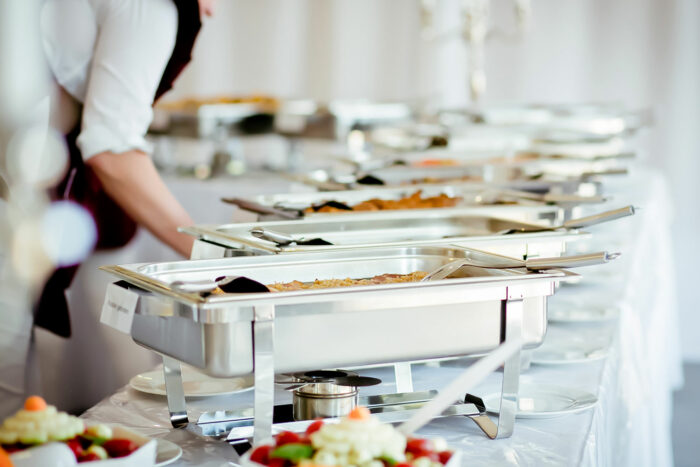How to Start a Catering BusinessStep by Step Guide
Most events, parties and even corporate gatherings revolve around one key thing – food.
Whether it is an elaborate and beautiful wedding or a smaller corporate meeting, caterers are in demand.
But a catering business is about much more than just putting food on your customers plates.
A successful caterer must be able to plan and execute the perfect event and for this reason, the catering industry attracts all kinds of entrepreneurs who are perhaps not only good at making food, but also excellent at planning and envisioning said perfect event.
If you already have the food prep portion of catering down and are great at planning and coordinating, getting through stressful situations, and have top notch organization skills, then perhaps catering is the right business venture for you.
In this “How to Start a Catering Business Guide” we are going to walk you through what you need to do to get your catering business started.
Before you know it, you’ll be catering your first event!

How to Start a Catering Business:
Build Your Brand
Before we dive too deep into the actionable items needed to setup your catering business, let’s first discuss your brand.
There are all types of catering businesses.
Some do large weddings and banquets or sit-down style events, others do buffet style events, and there are those that only host cocktail receptions or finger foods.
You don’t necessarily have to stick to only one style of service, but you will want to really think about your capabilities and what you are really good at before fine tuning your brand.
Your brand should represent what type of catering company you are and what type of services you offer – so spend some time deciding if y0u want to be a catering business that hosts all types of events or if you want to stick to a specific niche such as weddings or corporate events.
Once you have decided on the type of catering you want to do, you can choose a business name.
Choose a Business Name
Selecting a business name is really important to your brand.
It should be representative of what you are doing and most importantly, easy to remember.
If your business name is easy to remember, it will make it easier for customers to share it via word of mouth to their friends, families and coworkers.
Furthermore, as your grow and expand, you want your business name to be able to grow with you and again, be easy to remember.
If you plan on sticking to a specific type of cuisine, you can choose a name that is descriptive to the type of cuisine you will be serving.
Once you decide on a business name, you will need to check if the domain name is available.
If possible, your domain name should match your business name, making it easy for customers to find you online.
For example, if you catering business name is “Every Event Catering”, then you want your domain name to be www.everyeventcatering.com.
You can check if the domain name for your business is available here:
Find a domain starting at $0.88
powered by Namecheap
For more help with choosing a name for your business, visit our post here.
Register Business
Officially Register Your Business
To legally do business, you have to register your business with your local Secretary of State.
The first step is to decide on a business structure, also know as a business entity.
Your business is not legally recognized until you complete the appropriate formation paperwork with the government and state.
There are several business structures to choose from including sole proprietorship, limited liability company (LLC), Corporation, etc.
You will want to consult an attorney if you are not sure which business structure to choose.
You can also use a formation service that will handle the entire process for you.
Many small business owners choose an LLC (limited liability company) because it provides limited liability protection to you as the owner and it benefits from pass-through taxation.
LLCs are actually a really great choice for a catering business.
For example, say something goes wrong at an event that you catered and your business gets sued or goes under, your personal assets are separate and protected.
If someone comes after your catering business, your personal assets like your vehicle and house are protected!
Quick Business Formation Checklist:
- Select a business entity type: Sole proprietor, LLC, Corporation, etc.
- Obtain an EIN (Employer Identification Number) from the IRS – once your online application is complete, you will receive an EIN instantly.
- Register your business locally in the State in which you will be conducting business. This is done with the Secretary of State in the State in which you will be doing business.
- Obtain any business licenses or permits required in your State to operate a catering business. These can also be found at your local Secretary of State website or by simply doing a Google search. You will need a food handling license along with any licenses or permits your state requires. You will also have to pass a county or state health inspection if you are operating out of a commercial kitchen. Furthermore, there may be licenses needed for catering in certain venues.

Determine Pricing
This portion of starting a catering business is also extremely important because it will determine whether or not you can make a profit or at least break even while you get your feet off the ground.
The break even point is the point where your profits cover your expenses and you are not operating at a profit or loss – you are simply making enough to cover all of your expenses.
When determining your pricing, you want to make sure you are pricing in a way that covers your expenses (break even point) and leaves room for profits and growth.
Pricing will depend on your location as well as the type of catering you will be doing.
For example we can look at beef brisket – on average you can expect to pay $4-5 per pound – a typical brisket weighs 8-20 lbs. You also need to factor in the yield from the cut of meat (the meat will shrink and needs to be trimmed), the wood used to smoke, seasonings, charcoal, etc.
While some catering businesses do a set price list, others choose to do custom proposals based on their customers needs and wants.
You can also do a set base price list with room for add-ons and customizations.
This part is really up to you, just be sure to take your expenses into account so that you are not in a situation where you are undercharging and unable to cover all of your expenses.
Planning out your menu can help you put together a price list because you can make a list of the costs to be sure your pricing covers it.
Funding & Insurance
Fund Your Catering Business
Like most businesses, you will need some up-front funds to get your business started.
From catering equipment to hiring and training staff, you will need to put money up front before getting your first customer payment to cover the costs.
If you don’t already have some money set aside, there are other funding options such as getting a business loan or line of credit.
Some popular funding options include:
- Equipment loan/financing programs
- Business Credit Cards
- Business lines of credit
- Personal loan from friends or family
- Crowdfunding such as GoFundMe
- ROBS – rollover for business startups (use your retirement account to start your business)
You should plan on budgeting anywhere from $10,000 – $50,000 towards startup costs.
You will want to make a list of all of your anticipated expenses such as equipment, transportation, staffing needs, insurance costs, etc so that you know whether or not you need additional funding to get started.

Get Insured
Some states don’t actually require that your catering business be insured, but one mistake can cost you your business.
There are several types of insurance that you can purchase to protect your assets should you be sued or should someone get injured:
- General Liability Insurance – this is general coverage that we think every business should have at the very least
- Commercial Automotive Insurance – this covers your catering delivery vehicle
- Commercial Property Insurance – this covers your equipment and kitchen
- Unemployment Insurance – this is required if you plan on hiring employees
If you are not sure what insurance coverage you need, an insurance agent can help you.
Promoting Your Business
Marketing
Marketing is an ongoing part of your business.
Some business owners make the mistake of only marketing themselves until they get a few clients and then they stop, hoping that word of mouth is enough.
While word of mouth is a key part of gaining business, marketing efforts should be a continuous part of your growth plan.
Create a website with information about your services and what you offer along with gorgeous photos of your work.
Your contact information should be easy to find on the website.
Create business cards and flyers to hand out and depending on the type of catering you are providing, consider attending bridal shows or corporate shows to network and build connections.
LinkedIn advertising is another way to get your brand out there and buy leads.
Once you get a few clients, offer some sort of incentive for leaving a review or bringing you a referral.
For example, you can offer a gift card if they leave you a customer review or send you a referral.
When catering an event, use that as an opportunity to network as well by leaving your flyers and business cards where potential clients can easily see them.
Build the Best Reputation
Reputation is so important.
If you land a few clients and they are not happy, they will most likely tell all of their family, friends and acquaintances about their experience.
Bad news spreads fast and that is why it is key to make sure your customers are happy.
Some ways to do this are by providing the best customer service, communication, and of course – delivering on your promises.
If something goes wrong, fix it and do whatever it takes to make the customer happy.
Happy customers will recommend you which will lead to more business and growth.
FundsNet requires Contributors, Writers and Authors to use Primary Sources to source and cite their work. These Sources include White Papers, Government Information & Data, Original Reporting and Interviews from Industry Experts. Reputable Publishers are also sourced and cited where appropriate. Learn more about the standards we follow in producing Accurate, Unbiased and Researched Content in our editorial policy.
IRS.gov "Limited Liability Company (LLC)" Page 1 . January 28, 2022
SBA.gov "Choose a business structure" Page 1 . January 28, 2022
SBA.gov "Business Structures - Limited Liability" Page 1. January 28, 2022
